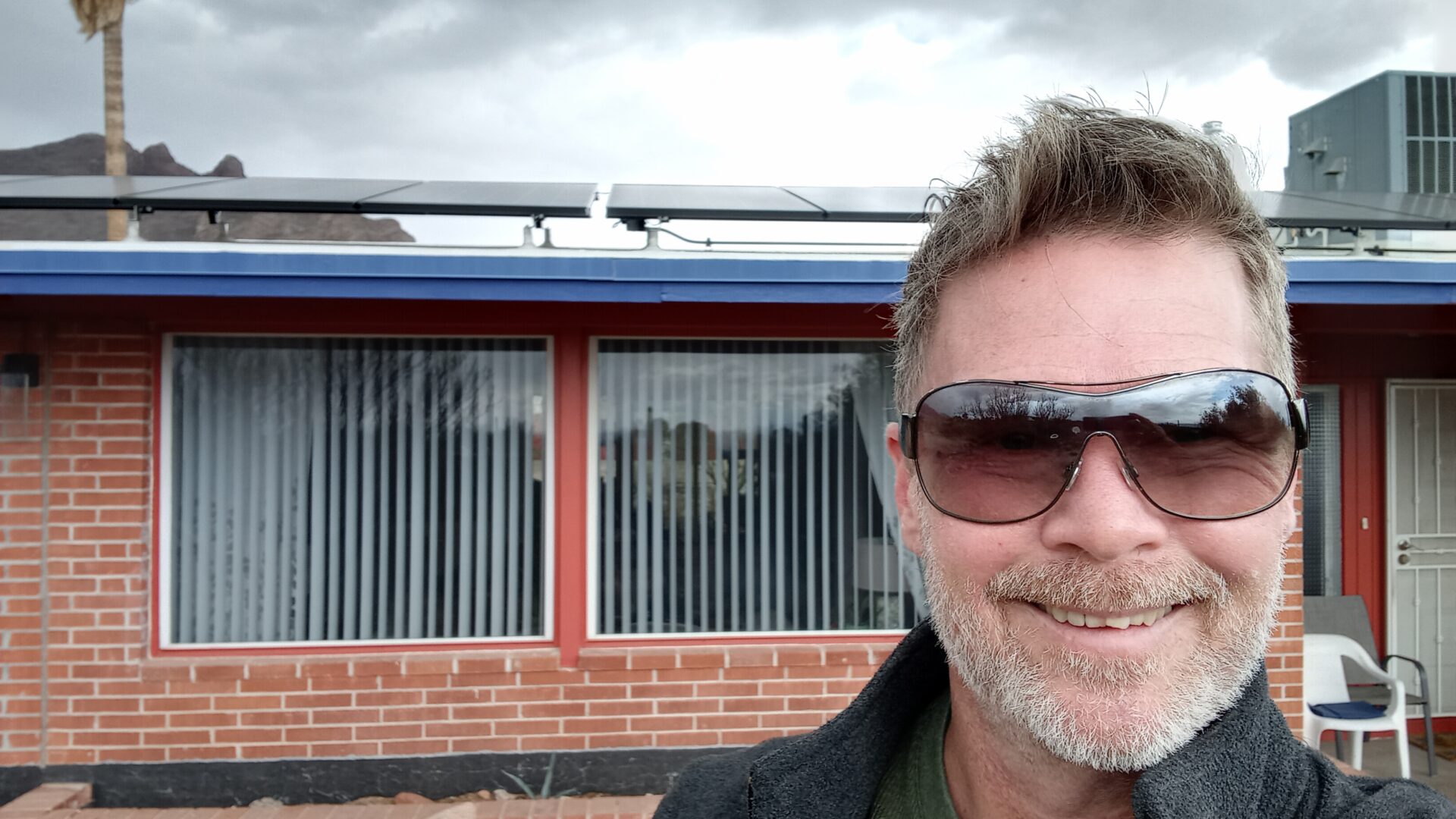Solar co-op, federal tax credit make solar a reality for Tucson homeowner
- IRA,
- Stories

NOTE: The tax credit expires at the end of 2025.
Congress voted to repeal the 30% tax credit for solar. Contact your members of Congress and share your support for solar energy.
When Jason DeBord purchased his Tucson, Arizona, home in 2011, he immediately recognized its potential for solar. With a long south-facing roof that receives 350 days of annual sunshine, Jason dreamed of powering his new home with renewable energy.
After settling in, he reached out to a solar installer for a project estimate. “The cost was prohibitive,” said Jason. “So we just put it on the back burner.” Years later, a series of cost-saving opportunities would bring solar back into the mix.
In 2021, Jason learned that Solar United Neighbors (SUN) was organizing a solar co-op for homeowners in the Tucson area. Through the co-op, he could receive a bulk-purchase discount on the cost of his system and be connected with a vetted, local installer selected by the group. Because there was no commitment to buy, Jason felt it was worth exploring. “Let’s see what number they can come back with,” he said at the time. “They came back with $17,000, which [was] lower than any estimates that we’d gotten.”
He was excited to receive a more affordable quote, but it still exceeded the budget. As he mulled next steps, co-op organizers shared they were offering financial assistance grants for income-qualified participants. Jason applied and was selected to receive the funding. “We got a $7,000 grant. It brought the cost of the system down to $10,000. And we had exactly $10,000 that we could spend.”
The final piece of the financial puzzle came in the form of a tax credit. In 2022, the federal government increased and extended the solar Investment Tax Credit (ITC) to 30%. Through the ITC, homeowners can deduct up to 30% of the out-of-pocket cost of a solar system from their federal income taxes. This incentive saved Jason another $3,000. “The 30% credit came through at exactly the right time. It was exactly what we needed,” he reflected.
In 2022, Jason installed a long-awaited 6-kilowatt solar array on his home. By becoming a source of distributed renewable power, he is continuing to see financial benefits. “Compared to our previous bills, I would say that we’re saving somewhere around $1,500 to $2,000 a year.” These utility savings are helping to ease financial strain and accelerate his return on investment.
Going solar helps families like Jason’s save money by taking control of where their energy comes from. More local solar energy benefits everyone by generating energy where
and when it’s needed the most — something Jason believes his hometown is uniquely positioned to lead on. “We are in Southern Arizona … if there is one place in the country where there should be an all-out effort to get as many solar systems up and running as possible, it would be here,” he reflected.
For that to happen, incentives that help make solar more affordable need to remain viable. Despite bipartisan support, solar opponents in Congress want to repeal important investments like the ITC, that help more Americans benefit from solar energy. These programs save homeowners money while creating good local jobs. Jason hopes his elected officials will continue to protect them. “I think that we need more incentives to help individuals embrace this clean energy technology — to make the investment.”
Jason is grateful for the programs and incentives that made the investment possible for him. Without those crucial savings, he would still be imagining an array on his roof, instead of enjoying the satisfaction of energy independence.
The sun is Arizona’s most abundant natural resource. Providing opportunities to harness that resource strengthens the well-being of its communities. Jason hopes his will continue to have that chance. “The community supports solar. The community supports solar tax credits. It supports more systems on more homes — more power generated by the sun.”
Act Now: Urge Congress to protect solar energy tax credits for all Americans
Solar energy is garnering support from both sides of the aisle. You can help keep up the momentum by making it loud and clear to your Senators and Representatives that Americans support federal solar investments.
Some members in Congress want to repeal successful policies that have made going solar more affordable for American families and businesses. Please use the form on this page to tell your federal representatives that you support smart investments, like the 30% solar tax credit.
Personalize your message!
If you have solar, explain how it is lowering and controlling your household’s energy costs. If you don’t yet have solar, tell them how these investments will make solar accessible for people like you.
Get the latest on solar straight to your inbox.
Fight for your solar rights.
Everyone has the right to go solar. Spread the sunshine nationwide and in your local community by taking action, joining events, and more.